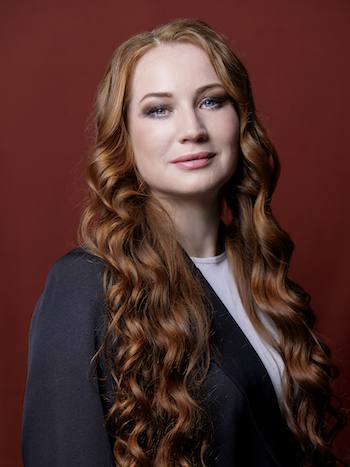
5 March 2026 19:00 | |
7 March 2026 18:00 | |
21 March 2026 19:00 | |
25 March 2026 19:00 | |
28 March 2026 14:00 |
The singer greatly succeeded as Carmen. She was a true gypsy girl – highly spirited, sensuous, with a powerful voice. Everything she said was understandable with no interpretation.
OTV-Prim
Having completed her studies at the Galina Vishnevskaya Opera Center, Tatiana Makarchuk was singularly good as Olga. By her sounding and image, she was the very country gamine we used to see in classical performances.
OperaNews.ru
Tatiana Makarchuk was born in the town of Bolshoi Kamen in the Primorsky Region. In 2008 she graduated from the Gnessin State Musical College where she studied with Lyudmila Ivanova.
In 2011 she entered the Galina Vishnevskaya Centre for Opera Singing where she studied with Galina Vishnevskaya, Sergei Murzaev, Elena Zaremba and Badri Maisuradze.
In 2013 she finished her studies at the Centre for Opera Singing. In the same year she graduated with a Red Diploma from the Russian Academy of Music where she studied with Ruzanna Lisitsian.
In 2012 she was accepted by the company of the Natalya Sats Musical Theatre where she made her debut in the role of Carmen from the opera of the same name by Georges Bizet. She performed the same part in the Bord Gáis Energy Theatre (Dublin, 2013). She was a participant of the Competizion dell’ Opera (Linz, 2013).
In 2013 she became a soloist of the Primorsky Opera and Ballet Theatre. Since 2016 she has been a member of the Opera Company of the Primorsky Stage of the Mariinsky Theatre.
In February 2018 she participated in a master class by Maria Guleghina.
In March 2018, she made her successful debut as Carmen from the opera of the same name by Georges Bizet at the Mariinsky-2 (St Petersburg).
In 2019, an audio recording of Sergei Prokofiev’s opera A Story of a Real Man with the participation of the artist became a laureate of the 2nd degree of the International Prize Pure Sound.
In September 2024, she participated in the touring performances of the opera Aida at the New Stage of the Bolshoi Theatre in Moscow, where she performed the part of Amneris.
In February 2025, she performed the parts of Grusha the Gypsy and Storyteller in the opera The Enchanted Wanderer by Rodion Shchedrin at the Concert Hall of the Mariinsky Theatre under the baton of Pavel Smelkov.
In June 2025, she performed at the Hvorostovsky Krasnoyarsk Opera and Ballet Theatre as part of a tour of the Primorsky Stage Opera Company.
Repertoire at the Primorsky Stage of the Mariinsky Theatre includes:
Carmen (Carmen, G. Bizet);
Amneris (Aida, G. Verdi);
Azucena (Il trovatore, G. Verdi);
Lyubov (Mazepa, P. Tchaikovsky);
Olga (Eugene Onegin, P. Tchaikovsky);
Polina, Milovzor (The Queen of Spades, P. Tchaikovsky);
Suzuki, Kate Pinkerton (Madama Butterfly, G. Puccini);
Hélène Bezukhova, Sonya (War and Peace, S. Prokofiev);
Princess Eboli (Don Carlo, G. Verdi);
Maddalena (Rigoletto, G. Verdi);
Lel, Bonny Spring (The Snow Maiden, N. Rimsky-Korsakov);
Solokha, Tsaritsa (Christmas Eve, N. Rimsky-Korsakov);
Tkachikha, Babarikha (The Tale of the Tsar Saltan, N. Rimsky-Korsakov);
Lyubasha, Dunyasha (The Tsar’s Bride, N. Rimsky-Korsakov);
Princess Clarice, Linetta (The Love for Three Oranges, S. Prokofiev);
Grusha the Gypsy, Storyteller (The Enchanted Wanderer, R. Shchedrin);
Laura (Iolanta, P. Tchaikovsky);
the Snow Queen, the Little Robber Girl (The Story of Kai and Gerda, S. Banevich);
Ratmir (Ruslan and Lyudmila, M. Glinka, concert performance);
Epanchina (Idiot, A. Smelkov, concert performance);
Cherubino (Le nozze di Figaro, W.-A. Mozart);
Third Lady (The Magic Flute, W.-A. Mozart);
Prince Orlofsky (Die Fledermaus, J. Strauss II);
Snake (The Little Prince, L. Klinichev).
Repertoire also includes:
Marfa (Khovanshchina, M. Musorgsky), Mlle Blanche, a demi-modaine (The Gambler, S. Prokofiev), Mary (Der fliegende Holländer, R. Wagner), Anjela (Simon Boccanegra, G. Verdi), Spring (The Snow Maiden, N. Rimsky-Korsakov), Naina (Ruslan and Lyudmila, M. Glinka), Inn Keeper, Marina Mnishek (Boris Godunov, M. Musorgsky), Varya, Klavdiya (The Story of a Real Man, S. Prokofiev), Marina (Doctor Zhivago, A. Lubchenko), Dzita (Gianni Schicchi, G. Puccini).
The singer’s repertoire also includes the mezzo-soprano parts by W.-A. Mozart's Requiem and G. Verdi's Requiem.
